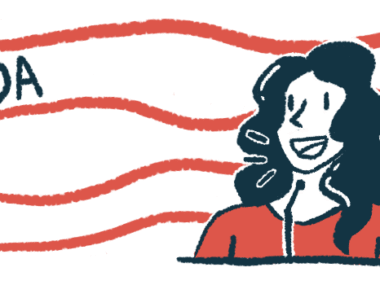I’m Learning to Accept the Benefits of My Mobility Aids
Written by |

I recently read an article in the Virginia Journal of Education that made me think about my feelings toward my mobility aids. The author, Kelly Hickok, is a wheelchair user, and she described how mobility aids give her a sense of freedom. She wrote, “We don’t view our wheelchairs or other mobility aids as ‘confining.’ Such assistance, in fact, is quite liberating because it gives us greater independence.”
I have Charcot-Marie-Tooth type 1A and wear ankle-foot orthoses (AFOs) to help with drop foot, ankle instability, and balance. I have a love-hate relationship with my AFOs. They help to improve my walking and allow me to accomplish more than I could without them. However, I still have issues with their appearance and how other people view them. I am working on my awkwardness about wearing them and have become more comfortable with wearing clothing that exposes my AFOs.
I often use a cane when walking long distances and on uneven ground, and to help with my balance. I’ve become more comfortable using my cane in public places where I expect to see people I know. However, I still feel a little embarrassed that I need to use it.
It makes it easier for me to walk and keep up when I’m out with a group and reduces my fatigue levels after a day out. So, why do I feel self-conscious about my cane? I am not sure. Do my mobility aids allow me to participate in more activities? The answer is yes, the aids allow me to get out and about more often.
Research has found that elderly patients with reduced mobility have poorer health-related quality of life. On the other hand, studies suggest that increased social interaction improved quality of life scores. That makes sense to me; if you can get out and about, you tend to feel more positive. If I am having a stressful day, going out to be among people helps to lift my mood. It seems that both social interaction and mobility can have a beneficial impact on mental health.
I can understand why people believe that their mobility aids give them more freedom. The aids allow them to go places and do things they couldn’t do otherwise. My AFOs and cane enable me to engage in more activities than I could before I had them.
Do I need to love my aids to see the benefits? No, but I should accept them for the advantages they give me. Perhaps I need to recognize that by using them, I am improving my quality of life. One day, I hope to be able to say without hesitation that my mobility aids are “liberating.” Meanwhile, I am working hard to overcome my hang-ups about living with a disability.
How do you feel about your mobility aids? Please share in the comments below.
***
Note: Charcot-Marie-Tooth News is strictly a news and information website about the disease. It does not provide medical advice, diagnosis, or treatment. This content is not intended to be a substitute for professional medical advice, diagnosis, or treatment. Always seek the advice of your physician or other qualified health provider with any questions you may have regarding a medical condition. Never disregard professional medical advice or delay in seeking it because of something you have read on this website. The opinions expressed in this column are not those of Charcot-Marie-Tooth News or its parent company, Bionews Services, and are intended to spark discussion about issues pertaining to Charcot-Marie-Tooth.






Joan Lisante
I could have written this! Yes, many of us have a love/hate relationship with mobility aids. But becoming a hermit is not an option, so I've learned to live with the situation, since any treatment/cure for CMT is unlikely to come soon enough to help this Baby Boomer.
Jill Price
I agree, we need to get out and do things despite our CMT!
Marilyn Jackson
I think because we don't have a disease that people know about and understand, and it's mainly invisible to people, that makes us feel more embarrassed about using mobility aids. I guess so many of us have been judged with CMT for being lazy etc. that also makes us want to hide it... I know when I use my wheelchair the freedom is incredible , but I dread people seeing me get up out of it and walk a short distance, because people assume that 'you cant walk if you use a wheelchair'... No matter how many times I explain it to people , they just don't get why i am 'choosing not to walk' and are using the chair... never the less as this disease is progressing faster and faster I now need to use the chair, and ignore the judgements, mainly among people i know, not so much strangers, I need to live my life and if that means they judge, well that's their problem not mine. (easier said than done.
Jill Price
That is awful, no one should question why you choose to walk or not walk. You need to do what is best for your body.
April Agostinello
I can definitely relate with you on that!! I’m constantly being put down as if I am choosing to be lazy and judged when I am able to do some things on a fluke good day or can manage something for a short amount of time, but in tremendous pain and horribly fatigued moments later or the next day and others just assume that if you can do it at all, you should be able to always do it. Thank all of you for sharing your experience and helping me not feel so alone in being embarrassed by using my mobility aids! Does anyone have any suggestions on how to wear open toe shoes or flip flops in the summer with a afo? I wear my brace faithfully in the winter, but my feet get so much worse every summer because I’m too hot to wear tennis shoes and long socks!
Sandi
I too, have a love/hate relationship with my AFO braces. I used to have the older
plastic, "up the back of your legs" type, but a few years ago received a new
state of the art brace which doesn't touch the calf at all. Its really much easier for me to wear and I believe helps me more than the others. However, I still have difficulty in accepting that I need them. I am also very stuck with the fact that I can no longer wear "cute" shoes, especially with dresses, etc. Sounds stupid I know.
Its odd, because I feel comfortable wearing them when I wear shorts ....I have
even realized that if people look at my legs, they'll notice my braces NOT my spider
veins!
Actually, in terms of "aids" I find myself wishing there were more for other effects of my CMT.... I turn red with embarrassment as people watch as I struggle to button a button or have something suddenly drop from my hands. I find it hard to explain to my friends when I am out with them that I will most likely bump into SEVERAL things ( including them) while we out going places...having my body not know where it is in the space around it is one of the most frustrating aspects of my CMT
Jill Price
It is can be so hard to live withe CMT some days. Thankfully, my hands are not as affected as my feet There are still many little things I struggle with on a daily basis.
Susan Maloney
Thank you for this article. I was diagnosed almost 7 years ago after experiencing a foot drop. A wonderful neurologist put me on the right path with a trainer and was able to get most of my foot mobility back. I have worked diligently to strengthen my hips and core but had a set back this spring when out walking and realized there was something very wrong with my gait. Further investigation led to PT, serious orthotics that needed special shoes and use of a cane or walking sticks when going distances and now working with a trainer again. I have been able to speak about my CMT but now am more aware of people taking in my balance issues & how I walk - a new normal. I especially miss wearing my cute shoes!! Thanks for letting me put this out there.
Jill Price
Thank you for sharing your story. I hope that you continue to share your story. I miss cute shoes, too.
Pamela
Hi Jill,
Do your students know about your cmt? I work in a kindergarten classroom and I hide my afos. Sometimes I think it would be a good lesson on inclusion to be open about my disability, but at the same time I am afraid of my employer doubting my ability to my job.
I would love to hear your experience as an educator.